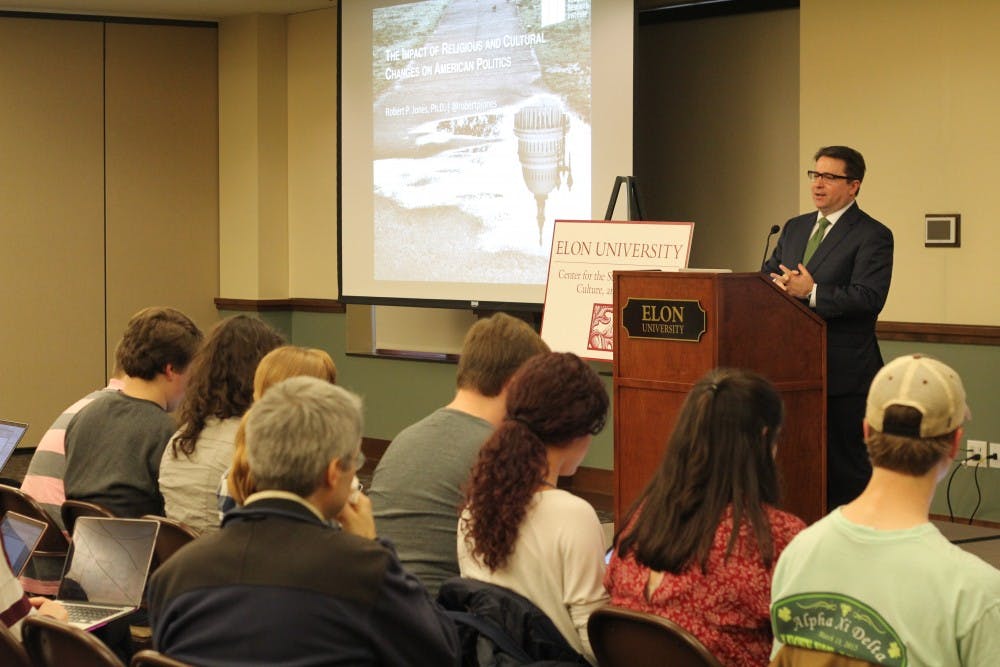It survived nearly 240 years. But according to Robert Jones, CEO of the Public Religion Research Institute in Washington, D.C., white, Christian America is at a foreseeable end.
In an event sponsored by the Elon Center for the Study of Religion, Culture, and Society, Jones spoke about the future of U.S. racial and religious demographics and how those demographics might affect the 2016 presidential election.
Moderated by Brian Pennington, director and professor of religious studies, Elon and surrounding community members attended tonight’s event was in the Moseley Center.
“The numbers I will show you tell a story,” Jones said. “They attempt to make some sense of the twists and turns of this election, particularly when applied to social issues like immigration, gay and lesbian rights, and rights of reproduction.”
Jones presented the PRRI’s findings through a series of informative, statistical graphs and highlighted the dramatic changes in American political sentiment resulting from evolving demographics.
One such graphic touched on the rise of non-religious, or “none”, individuals in the nation. Since 1974, the percentage of Americans who identify as “none” surged from 7 percent to 23 percent.
As the percentage on non-believers is increasing, the number of people of faith is declining. For example, since 1974, the percentage of U.S. Protestants had dropped from 63 percent to 46 percent, according to Jones.
Jones said this shift in how people view themselves religiously has a dramatic effect on the electorate and greater political landscape.
“If the trends hold, by 2024 we will see the first time when the white Christian voter population is a minority," Jones said.
This has the potential to significantly affect upcoming elections.
According the PRRI’s website, about eight in 10 Mitt Romney voters were white Christians. On the other hand, President Barack Obama’s coalition rested on the two very different cornerstones: minority Christians and the religiously unaffiliated. Only 35 percent of Obama’s voters were white Christians.
Video Clip: Jones talks about the relationship between religion and politics in the 2012 presidential election and how emerging data might impact the upcoming presidential race. Video by Elon Local News.
Jones also noted the changes that come with the introduction of new generations.
According to his data, only 11 percent of Americans 65 and older identify as non-religious while 36 percent of those between the ages of 18-29 identify as non-religious.
In additional surveying of the U.S. populations, Jones and his institute found that 43 percent of those over 70 believe Christianity was and always has been a cornerstone of being American. Just 26 percent of Millennials share that same belief.
“Different generations think differently about their religious identity,” he said. “This also affects the way people think about what it means to be an American.”
A portion of the evening’s discussion was dedicated to what Jones termed “social anxieties"— issues of race, immigration, and sexuality. His data shows that the issues are very much partisan and racially founded.
Video Clip: Jones offers insight into the role religion might play in the upcoming presidential election. Video by Elon Local News
Sixty-four percent of Republicans find reverse-discrimination (discrimination against whites to be as bad as that of traditional minorities) to be a major issue, while 25 percent of Democrats feel the same.
Eighty-five percent of African-Americans say that the shootings of unarmed black men is indicative of a larger cultural pattern while only a third of white Americans agree.
One of the major memorable moments for students occurred when they learned whites will eventually become a minority. Senior Bobby King noted that whites will be a first-time minority in the United States by 2042.
“It’s amazing to me the cirque du soleil performance people go through to put the blame on victims in those scenarios," King said. "A lot of it plays into the 'take the country back, doom and gloom rhetoric heard at many GOP rallies. People are afraid of the country changing demographically.”
Elon Community Church Senior Pastor Randy Orwig said he was troubled by the findings Jones had reported.
“I was expecting those figures, but hoped for something different," Orwig said. "It saddens me that animosity is the end result, but we’re moving in a direction that is kind of unstoppable.”


